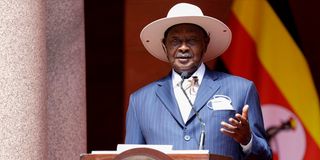Yoweri Museveni: Sudan belongs to the people, not army

Ugandan President Yoweri Museveni. He has condemned the fighting in Sudan, calling it a misuse of force that undermines all progress made through dialogue over the past few months. PHOTO | GUILLEM SARTORIO | AFP
What you need to know:
- Museveni reiterated that Sudan's warring generals should do away with politics of identity and concentrate on politics of interest.
- On April 17, he condemned the fighting as a misuse of force that undermines all progress made through dialogue.
- Uganda last month successfully evacuated slightly over 200 of its citizens who had been trapped in Khartoum.
Kampala,
Ugandan President Museveni has renewed calls for a ceasefire in Sudan and warned the army against personalising the country at war.
He made the remarks after meeting Special Envoy of the Chairman of the Transitional Sovereignty Council in Sudan, Dafallah Al-Haj Ali, at State House in Entebbe, where the two are said to have discussed the conflict in the northern African country where two rival generals are fighting for control.
“A ceasefire is critical to allow peace for people to elect their leaders as owners of the country. The country does not belong to the Sudan Army, it belongs to the people,” Museveni tweeted after the Wednesday meeting.
Sudan was plunged into the latest round of fighting on April 14 between the country's national army led by General Abdel Fattah al-Burhan and the paramilitary Rapid Support Forces (RSF) commanded by his former deputy and fellow coup leader, Mohamed Hamdan Daglo 'Hemedti'.
The former allies disagreed on plans to integrate Hemedti's RSF fighters into the mainstream Sudanese army, which would reportedly weaken al-Burhan militarily and politically.
Ceasefires violated
The warring sides have repeatedly violated ceasefire agreements, with neither side yielding to truce calls made by the United Nations, the African Union and the Inter-Governmental Authority on Development (Igad) among others.
International media reported explosions in Khartoum on Wednesday morning, with hundreds of deaths and thousands being displaced.
Mr Museveni also cautioned the Sudanese leadership against sectarianism.
“I reiterated my earlier advice that they should do away with politics of identity and concentrate on politics of interest,” he said.
On April 17, he condemned the fighting as a misuse of force that undermines all progress made through dialogue over the last many months.
“We cannot keep papering over mistakes of unprincipled politics year after year,” State House quoted him in a statement issued following an emergency virtual Igad member states’ meeting.
Kampala, Nairobi and Addis Ababa have been keeping tabs on the delicate security situation in Sudan, with heightened concerns of the conflict spilling over into the region.
Over 500 killed
On May 3, Kenyan President William Ruto called out General al-Burhan and General Dagalo for their continued role in the internal conflict that has left a trail of disaster in the country.
The United Nations estimates that more than 500 civilians have been killed in air strikes, gunfights and shelling as about 50,000 others flee to the neighbouring countries as efforts to hold peace talks between the two generals falter.
Dr Ruto said there was no reason for violence yet what the two are differing about can be solved through dialogue. He said Kenya is determined to stop the continent from sliding into military rule, an era, he said, belongs to the past.
“We want to send very clear signals to our brothers in Sudan that this continent will not entertain any military rule. They have no business whatsoever destroying the hard-earned years of developing Sudan. The bombing of buildings, hospitals and infrastructure is unacceptable ... we will hold them accountable,” said Dr Ruto.
He termed as unfortunate the unravelling transition after painstaking work.
“As Kenya, we will be playing our role [arbitrating the conflict] because we owe it to our brothers and sisters in Sudan,” he said.





